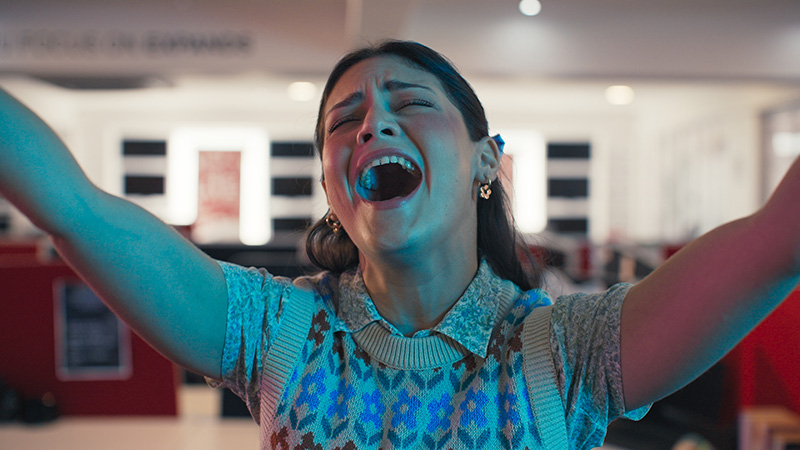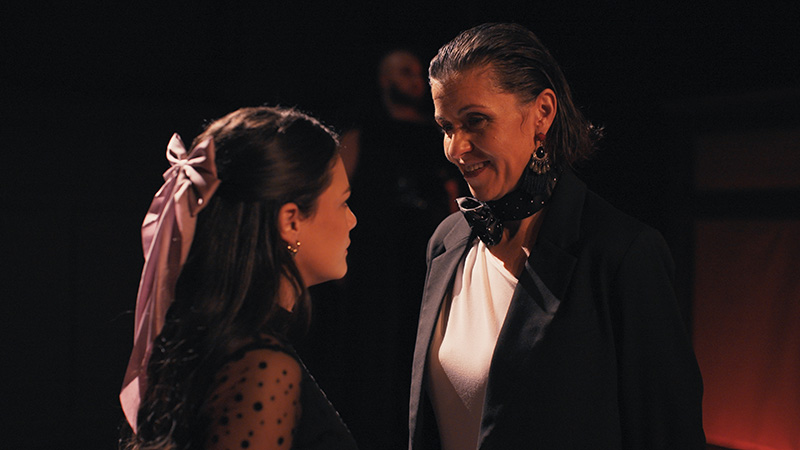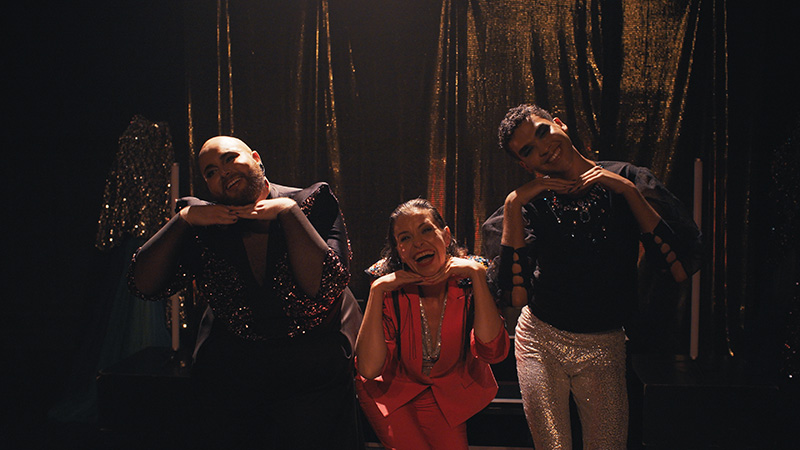


Shotgun short film: Deuntjie
She is a perfectionist, ticking off points on lists meticulously, driven by a consuming passion for what she undertakes. There are simply no limits to the enthusiasm Adri Britz exudes for the creative world she inhabits.
Adri’s Deuntjie is the first musical comedy ever at the Silwerskerm Festival this year, presented in the Shotgun short film category. The category is open to established filmmakers to demonstrate their skills with short films.
Deuntjie examines that little voice residing in every person’s head. In the case of Deuntjie (Anja Taljaard), a shy, conscientious girl, the voice has a name: Vera (Daneel van der Walt), a larger-than-life diva, accompanied by two flamboyant backing vocals, Moses and Jacob. They perform and cause commotion in poor Deuntjie’s head. When Deuntjie has trouble to distinguish between reality and the voices in her head, matters get out of hand.
Adri Britz elaborated on her film.
You have extensive experience in a range of fields in the entertainment industry. What motivated you to enter for the Shotgun shorts?
I simply decided “Why not?” and submitted the concept of Deuntjie. But I have made a narrative film before, and I directed Dina Dagbreek, so I couldn’t enter the New Film category of the festival, until they suggested the Shotgun shorts option.
I am grateful that it happened. Deuntjie is pretty much out of the box with the musical aspect making it totally different. Deuntjie is also the very first musical comedy in Silwerskerm’s history. I wanted to do something entirely different this time around, and I like juxtaposing things. As is the case with Deuntjie (Anja Taljaard) and Vera (Daneel van der Walt). One would expect the little voice in the shy and reserved Deuntjie’s head to belong to an old lady who knits the day away, but Vera presents herself as a massive diva with endless self-confidence. I wanted to show how each one of us possesses Vera’s self-confidence, and that it is up to us to acknowledge that inner voice.
My struggle with the voice in my own head, even though she doesn’t have a name, emanated from that. I had to grapple with her to get a sense of how viewers will experience Deuntjie.
What message would you like to convey to viewers?
For me, it is about the importance of finding the intrinsic value of your own voice through comedy and music. It belongs to a genre that covers various facets, and nowadays films provide space for all those facets.
The production was completed in a very short period. Tell us about the biggest challenges in meeting the tight deadlines.
I had four says to shoot Deuntjie. And budgets always pose major challenges. But yes, time was the biggest challenge of all. Also, the musical component. Songs and lyrics can be up to three pages long. A scene with two actors is normally done and dusted within two hours, but with music it becomes a different story. There are rehearsals and pre-recordings, and then the actors have to move in front of the cameras to give a life performance. What usually takes two minutes, suddenly lasts up to five hours. Not to mention the stage lighting that should match the music, the planning involved in blocking for both camera and stage, every movement that must be synchronised to a beat, and of course, actors should remember to sing!
Also, actors must repeat a scene over and over: once for a wide angle shot, then close-ups and then for single shots. Thank goodness for Wesley (West, responsible for the original score) being at hand to do the playbacks. It remains a challenge to add the music to a film, and with time in short supply, you have to think on your feet. In this regard, I am in great debt to the team, especially cinematographer Eduan Kitching who managed to capture the beautiful images and the essence of the story. Everybody involved with this unique project only wanted to give their very best.
Having produced several narrative films in the past, were there perhaps a surprise or two that surfaced with Deuntjie?
Yes! I encountered surprises throughout. The actors amazed me constantly, and of course the fact that we managed to complete the shooting in four days.
Eduan was brilliant in securing all the angles. What he managed to create was miraculous and insane. Also, CA van Aswegen, the editor, has so much talent.
How do you feel about musical films?
I studied musical theatre after school and sometimes musicals come across as totally unrealistic. This time I just didn’t have enough time and money to have people dancing on cars, but I want to make musicals cool again, with crazy musical elements, especially in Afrikaans. Beautiful lyrics are simply not enough. The music must be like dialogue, authentic and accessible, driven by the lyrics and the characters.
Are there characters you identify with?
It was crucial for me to identify with the characters – and I do so with both Deuntjie and Vera. I am an extroverted introvert. When I socialise, I am very similar to Vera, but at home I am Deuntjie … Just leave me alone for a bit!
Is there anything people may not know about the two main actors in Deuntjie?
Many people probably don’t know that Daleen and I were in the same school, Pro Arte Alphen Park, where we started an a capella group – The Rustic Divas. To hear Daleen singing is divine, and I wanted to show people how versatile she is as an actor … And that voice!
From the very beginning, Anja Taljaard just blew me away with her talent. Initially, she auditioned for the role of Claudia, but when I laid eyes on her, I offered her the part of Deuntjie. She is incredibly talented.
Do you have any advice for people taking their first steps in the entertainment industry?
Most important is to get yourself on a set as soon as possible. Any department. I started out as a production manager, and once you are on a set, you get to know what each department does.
On the set of Deuntjie we had young writers working as assistants and runners – which I found encouraging. To be a good director, producer or writer, you must know how everything fits together. This basic knowledge, as well as the ability to work with people, is vitally important. You should be prepared to get your hands dirty. And while at it, you must observe everything happening on the set. Effective communication is also very important.
Which movie or project would you wish to tackle if you had an unlimited budget?
It would definitely be a grand musical like Moulin Rouge or Chicago; more than just a movie in which people burst into song. Much rather one in which the entire office staff jump on the desks to dance … Great musical numbers with dancers and choreographers!
